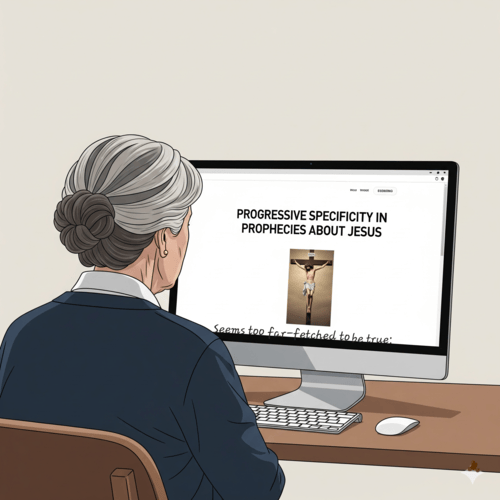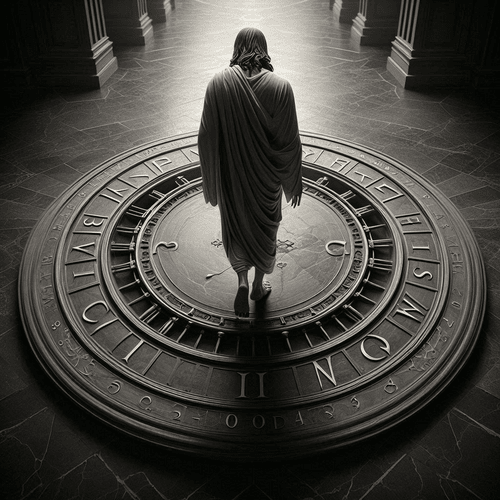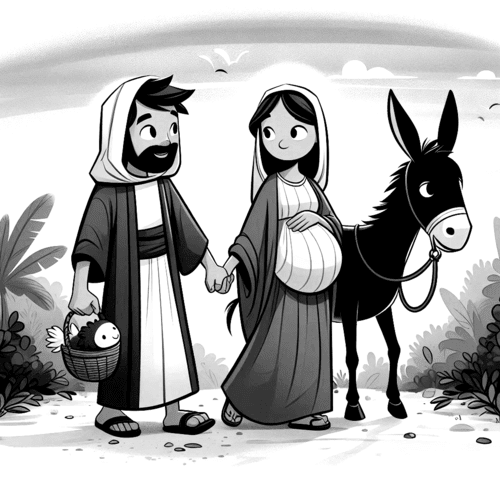Messianic Prophecies: Progressive Specificity You Just Can’t Ignore
What if God left humanity a trail of clues spanning 4,000 years—not cryptic riddles, but systematic eliminations that methodically narrowed the entire human race down to one specific individual? What if each clue built upon the last, creating a funnel of divine precision that moved from billions of possibilities to thousands, from thousands to hundreds, from hundreds to dozens, until only one Man could possibly fit the description?
This isn’t hypothetical. This is exactly what the Messianic prophecies of the Old Testament accomplish through what we might call “progressive specificity”—God’s breathtaking strategy of systematically eliminating candidates across millennia until only Jesus of Nazareth remains standing. While scholars recognise the mathematical improbability of one person fulfilling hundreds of specific prophecies, few fully grasp the surgical precision with which God narrowed the genealogical field itself. The odds aren’t just astronomical—they’re designed to be unmistakable.
THE FOUNDATION: FROM ALL HUMANITY TO ONE LINEAGE
It begins in Eden with humanity’s first parents. After the Fall, God doesn’t leave Adam and Eve hopeless. Instead, He makes the first Messianic promise: “I will put enmity between you and the woman, and between your offspring and hers; he will crush your head, and you will strike his heel” (Genesis 3:15).
From every human who’d ever live, God immediately establishes the promised Redeemer will be born of woman—fully human, not angelic or divine in origin alone. More significantly, the promise specifies “her offspring” will triumph, pointing to a human champion who will defeat sin.
Fast-forward through the catastrophic flood. When humanity gets a fresh start through Noah’s family, God doesn’t leave the promise vague. The blessing falls specifically on Shem’s line: “Praise be to the Lord, the God of Shem!” (Genesis 9:26). From three sons, the promise flows through one. The odds: 1 in 3.
The net begins to tighten.
ABRAHAM TO JACOB: NARROWING THE BLOODLINE
Centuries later, in the bustling city of Ur, God calls out one man: Abraham. Not his brothers Nahor or Haran, but specifically Abraham receives the covenant promise: “All peoples on earth will be blessed through you” (Genesis 12:3).
But Abraham has two sons. Ishmael, the firstborn, seems the natural choice by human standards. Yet God specifies Isaac: “It is through Isaac that your offspring will be reckoned” (Genesis 21:12).
Isaac also fathers twins, and again human logic suggests the firstborn would carry the promise. But God bypasses Esau and chooses Jacob, later renamed Israel. Before the twins are even born, God declares: “The older will serve the younger” (Genesis 25:23).
From all of humanity’s descendants, we’re now down to the children of one man, Jacob.
THE TRIBAL SPECIFICATION: FROM TWELVE TO ONE
Here’s where the specificity becomes stunning. Jacob has twelve sons, founding the twelve tribes of Israel. Any one of these tribes could theoretically produce the Messiah. The odds of selecting the correct tribe by chance? 1 in 12.
But there’s no guesswork involved. On his deathbed, Jacob delivers prophetic blessings to each son, and for Judah, the words are unmistakably Messianic: “The sceptre will not depart from Judah, nor the ruler’s staff from between his feet, until he to whom it belongs shall come and the obedience of the nations shall be his” (Genesis 49:10).
Not Reuben the firstborn. Not Levi the priestly tribe. Judah—the royal tribe.
From billions to one tribe. God’s progressive specificity continues its relentless march toward a single individual.
THE DAVIDIC DYNASTY: FROM TRIBE TO ROYAL HOUSE
Within the tribe of Judah, numerous families could claim prominence. Yet centuries later, God demonstrates His precise selection once again. When the prophet Samuel arrives at Jesse’s house to anoint Israel’s next king, he examines seven impressive sons. Each one seems like royal material by human standards. But God repeatedly tells Samuel, “This is not the one.”
Finally, Jesse mentions his youngest son—a shepherd boy tending flocks in the fields. The moment David appears, God declares: “Rise and anoint him; this is the one” (1 Samuel 16:12). From all of Jesse’s sons, God handpicks the unlikely youngest.
This shepherd boy then receives the eternal covenant: “Your house and your kingdom will endure forever before me; your throne will be established forever” (2 Samuel 7:16). Every ancestor in the Messianic lineage was carefully handpicked—the genealogy was already finalised in God’s sovereign plan.
The prophet Isaiah later crystallises this promise: “For to us a child is born, to us a son is given, and the government will be on his shoulders… Of the greatness of his government and peace there will be no end. He will reign on David’s throne and over his kingdom” (Isaiah 9:6-7).
Notice how the prophecy weaves together seemingly unrelated details. The Messiah must be from Eve’s seed, Shem’s line, Abraham’s family, Isaac’s rather than Ishmael’s branch, Jacob’s rather than Esau’s descendants, Judah’s tribe specifically, and David’s royal house particularly.
But God isn’t finished. Even within this incredibly narrow lineage, we see divine grace extended to unlikely candidates. Rahab the Canaanite prostitute and Ruth the Moabite widow both find their way into the Messianic line (Matthew 1:5). Progressive specificity includes progressive inclusion—God’s plan encompasses both Jewish and Gentile heritage.
GEOGRAPHIC AND TEMPORAL PRECISION
As if genealogical specificity weren’t enough, the prophets add geographic precision. The Messiah won’t just come from David’s line; He’ll be born in David’s city: “But you, Bethlehem Ephrathah, though you are small among the clans of Judah, out of you will come for me one who will be ruler over Israel” (Micah 5:2).
From any city in the ancient world, God specifies one small town. The mathematical improbability continues to compound.
The prophet Daniel even provides timing clues with his “seventy weeks” prophecy (Daniel 9:24-26), indicating the Messiah will come and “be cut off” before the destruction of Jerusalem and its temple—which historically occurred in 70 AD.
WHY PROGRESSIVE SPECIFICITY MATTERS
This wasn’t divine improvisation—it was divine orchestration spanning millennia. God didn’t just send His Son into the world; He carefully prepared the world for His Son’s arrival, leaving an unmistakable trail of evidence.
Consider the mathematical impossibility. Even using conservative estimates, the combined odds of someone randomly fulfilling just the major prophetic specifications we’ve discussed exceed 1 in several thousand. Add the hundreds of other Messianic prophecies regarding the Messiah’s ministry, death, and resurrection, and the odds become astronomically impossible.
This level of precision serves a crucial purpose. As Luke writes in his Gospel, these details exist “so that you may know the certainty of the things you have been taught” (Luke 1:4). Faith isn’t blind belief—it’s confidence built on overwhelming evidence.
The progressive specificity also reveals God’s heart. This redemptive plan wasn’t an afterthought responding to human failure. Paul tells us we were “chosen in him before the creation of the world” (Ephesians 1:4). The breadth and depth of this prophetic preparation demonstrates the extent of God’s love and commitment to human redemption.
THE WATERTIGHT CASE
The numbers don’t lie. From billions of potential candidates across human history to one carpenter from Nazareth, the Old Testament creates a prophetic fingerprint so precise that mathematical coincidence becomes intellectually dishonest. Progressive specificity reveals God’s master strategy: not vague predictions that could apply to anyone, but systematic eliminations that could apply to only one. Every generation brought the promise closer. Every prophetic specification made the target smaller. Every fulfilled detail made the case stronger.
This is more than fulfilled prophecy—this is divine authentication written in mathematical language that transcends cultural barriers and historical epochs. The God who orchestrated progressive specificity across centuries didn’t leave His most important message to chance or interpretation. He left it written in probabilities so staggering that denial requires more faith than belief. From billions to one—the most compelling love story ever told, and the most mathematically precise case ever made for the identity of humanity’s Redeemer.
MESSIANIC PROPHECIES: RELATED FAQs
Why do some prophecies (like Isaiah 7:14) seem to have dual fulfilments? Reformed scholars recognise the concept of “typological fulfillment” where Old Testament events prefigure greater New Testament realities. Isaiah 7:14’s immediate context involves a sign to King Ahaz, yet Matthew 1:23 applies it to Jesus’ virgin birth. Reformed theology sees this as God’s sovereign design—historical events serving as types that point forward to ultimate fulfillment in Christ. This actually strengthens progressive specificity by showing God orchestrating both immediate and ultimate meanings throughout history.
- How do we know these prophecies weren’t written after Jesus lived (post-dated)? Archaeological discoveries, particularly the Dead Sea Scrolls (dating 250 BC-68 AD), contain complete or partial texts of every Old Testament book except Esther, including detailed Messianic prophecies. The Septuagint (Greek Old Testament) was translated around 250 BC, demonstrating these prophecies existed centuries before Christ. Additionally, the mathematical complexity of progressive specificity across multiple authors and centuries makes post-dating virtually impossible—no conspiracy could coordinate such intricate detail across so many independent sources.
- What about the “70 weeks” prophecy in Daniel 9—how specific does it get? Daniel 9:24-26 provides remarkably precise timing, predicting the Messiah will be “cut off” after 69 “weeks” (commonly interpreted as weeks of years = 483 years) from the decree to rebuild Jerusalem. Reformed scholar Sir Robert Anderson calculated this timeline pointing to Jesus’ triumphal entry and subsequent crucifixion with stunning accuracy. This temporal specificity adds another layer to progressive revelation—not just genealogical and geographical precision, but chronological precision spanning centuries.
- Why does the Messianic line include foreign women like Rahab and Ruth? This demonstrates God’s electing grace extending beyond ethnic Israel from the beginning. Matthew deliberately highlights these women in Jesus’ genealogy (Matthew 1:3-6) to show the Messiah came not just for Jews but for all nations. Progressive specificity doesn’t narrow to exclude, but narrows to include—showing God’s redemptive plan always encompassed Gentiles. This anticipates Paul’s teaching that Gentiles are “fellow heirs” in God’s kingdom (Ephesians 3:6).
- How do we handle apparent contradictions between Matthew’s and Luke’s genealogies? Most commentators propose that Matthew traces Jesus’ legal lineage through Joseph (the royal line), while Luke traces Mary’s biological lineage (the priestly/natural line). This actually strengthens the case for progressive specificity—Jesus fulfils both kingly (Davidic through Joseph) and priestly (possibly Levitical through Mary) requirements. Some scholars suggest Luke follows the levirate marriage principle, but either way, both genealogies confirm Jesus’ legitimate claim to the Davidic covenant through multiple independent lines.
- Were there other Jewish claimants who tried to fulfil Messianic prophecies? History records numerous messianic pretenders—Bar Kokhba (132-135 AD), Simon Magus, Theudas, and others. However, none could demonstrate the comprehensive fulfillment of progressive specificity that Jesus accomplished. Reformed scholars note Jesus alone possessed the correct genealogy, birthplace, timing, and ministry characteristics prophesied centuries earlier. The specificity of Old Testament prophecies actually served as a divine “authentication system” that false messiahs could not replicate, making Jesus’ fulfillment even more remarkable.
How does progressive specificity relate to God’s covenant theology? Progressive specificity highlights the unfolding of the covenant of grace throughout redemptive history. Each genealogical narrowing represents God’s covenant faithfulness—from the Adamic covenant through the Abrahamic, Davidic, and New Covenants. John Calvin emphasised that God’s election operates through historical means, and progressive specificity demonstrates this principle perfectly. The increasing precision shows God working through secondary causes (human genealogy, historical circumstances) while sovereignly directing all events toward the predetermined goal of Christ’s incarnation.
MESSIANIC PROPHECIES: OUR RELATED POSTS
- Is Jesus the Jewish Messiah? Seven Arguments You Can’t Ignore
- The Bethlehem Connection: Why God Chose a Humble Town For His Son
- The Rahab Mystery: Why Is A Prostitute in Jesus’ Family Tree?
- The King is Born: How Ancient Prophecies Foretold Jesus’ Arrival
- Nails and Piercing in Prophecy: Why The Messianic Details Matter
- Isaiah’s Servant Songs: Why Are They Central to Messianic Prophecy?
- Jewish Objections to Christianity: Addressing Messianic Challenges
Editor's Pick

From Empty to Overflow: The Abundant Life Jesus Promised
(AND WHY YOU SHOULDN’T SETTLE FOR LESS) We're surviving, but are we thriving? If we're honest, there's a gap between [...]

What Does Jesus Save Us From?
THREE BIBLE TRUTHS ABOUT SALVATION "Jesus saves." We’ve seen it on bumper stickers, heard it shouted at sporting events, maybe [...]

If God Wants Everyone Saved, Why Aren’t They?
THE REFORMED VIEW ON GOD’S DESIRE VS HIS DECREE The question haunts every believer who has lost an unbelieving loved [...]

The One Man Mystery in Acts 17:26: Is It Adam Or Noah?
When the Apostle Paul stood before the philosophers at Mars Hill, he delivered an insightful statement about human unity: “And [...]

Megiddo Or Jerusalem: Where Did King Josiah Die?
Recent archaeological discoveries at Tel Megiddo continue to reveal evidence of Egyptian military presence during the late 7th century BC, [...]

Losing Your Life Vs Wasting It: How Are the Two Different?
AND WHY DID JESUS PRAISE THE FORMER? Jesus spoke one of the most perplexing statements in Scripture: “For whoever wants [...]

Can Christians Be Demon Possessed? What the Bible Teaches
Perhaps you’ve witnessed disturbing behavior in a professing Christian, or you’ve struggled with persistent sin and wondered if something darker [...]

Sacred Fury: What Christ’s Temple Cleansing Truly Means
Mark 11 records the crack of a handmade whip that echoed through the temple corridors. Tables crashed to the ground, [...]

Did Jesus Cleanse the Temple Twice?
OR DID JOHN DISAGREE WITH THE SYNOPTICS ON TIMING? One of sceptics’ favourite "gotcha" questions targets what they see as [...]

Self-Authentication: Why Scripture Doesn’t Need External Validation
"How can the Bible prove itself? Isn't that circular reasoning?" This objection echoes through university classrooms, coffee shop discussions, and [...]
SUPPORT US:
Feel the Holy Spirit's gentle nudge to partner with us?
Donate Online:
Account Name: TRUTHS TO DIE FOR FOUNDATION
Account Number: 10243565459
Bank IFSC: IDFB0043391
Bank Name: IDFC FIRST BANK






